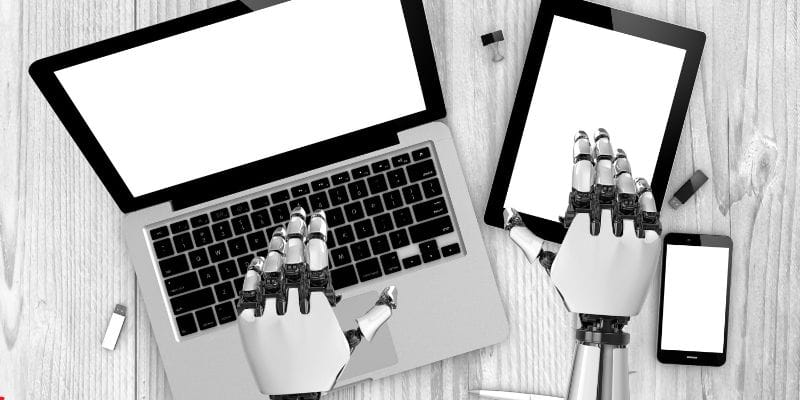Artificial intelligence (AI) has established itself as a key tool in the evolution of retail, redefining the way physical shops and digital platforms operate and engage with their customers. Applied to the retail sector, AI refers to the use of technologies that automate processes, analyse large volumes of data in real time and make strategic decisions that optimise business profitability.

Today, retail faces unprecedented challenges: fierce competition, rising consumer expectations and a constant demand for operational efficiency. AI responds to these needs with solutions such as machine learning, natural language processing, computer vision and predictive systems, among others.
These advances not only make it possible to analyse shopping patterns, but also to understand in-store consumer behaviour. The collection of data through cameras and sensors has made it possible to create heat maps that show exactly where customers are concentrated and which products receive the most attention, representing a quantum leap in terms of point-of-sale analysis.
AI is also present in CRM (Customer Relationship Management) systems, which use intelligent algorithms to segment audiences, personalise marketing campaigns and predict the probability of conversion for each customer.
Therefore, talking about artificial intelligence in retail is not just a technological fad. It is dealing with a real transformation that affects everything from inventory management to the personalised shopping experience. A revolution that is shaping the present and future of retail.
How AI is transforming physical and online shops
The impact of artificial intelligence in retail extends to both physical shops and digital platforms. This transformation is based on the ability to connect disparate data – from online browsing to in-store behaviour – to generate smarter decisions.

In the physical environment, retailers are integrating cameras with machine vision to identify in-store traffic patterns, optimise product layout and even adjust prices in real time based on demand or available stock. These systems can detect which items are browsed, which are frequently returned and which generate the most visual interest, providing key information about the product lifecycle.
A retailer can, for example, adjust the shop layout based on the data collected, or launch personalised promotions directly to the customer ‘s mobile phone when they approach a certain area of the store. This contextual personalisation makes the shopping experience a more seamless, engaging and profitable process.
On the digital front, AI is making it possible to fully personalise the customer journey. From product recommendations based on previous purchases to dynamic price adjustments that compete in real time with other online shops, e-commerce is undergoing an algorithmic revolution.
In addition, online platforms are using machine learning to fine-tune their logistics, forecast consumer trends, and automate stock replenishment. Data thus becomes a strategic raw material to optimise processes, reduce costs and enhance the end-user experience.
Ultimately, in both physical shops and online channels, AI acts as an integrating hub of efficiency and value, redefining what it means to be competitive in the 21st century.
Leading AI solutions for retailers: from inventory to the customer
The artificial intelligence solutions available to retailers are extensive and constantly evolving. They range from tools that improve internal management to those that directly impact the customer experience.

One of the most prominent applications is in inventory optimisation. AI-based systems make it possible to accurately measure stock in real time, anticipate demand and automate the replenishment process. This technology helps to prevent both overstocking and stock-outs, reducing losses and improving product availability.
Another key innovation is real-time price modification. Based on analysis of multiple variables – demand, seasonality, competition, consumer behaviour – algorithms can adjust prices instantly to maximise margins and conversion.
At the point of sale, smartsensors and cameras are being used to measure footfall, movements and the time customers spend in front of products. This information is translated into heat maps and navigation patterns that allow products to be strategically rearranged, maximising sales opportunities.
From a marketing perspective, retailers are integrating AI into their CRMplatforms and recommendation engines. These tools personalise messages, promotions and product recommendations with surprising accuracy, increasing loyalty and average purchase ticket.
Finally, one cannot overlook the role of AI in warehouse management, where it is used to automate processes, optimise picking routes and coordinate last-mile logistics. All this drastically reduces lead times and improves the overall efficiency of the supply chain.
AI is no longer a promise but an essential element of modern retail operations, enabling businesses to evolve into smarter, more agile and customer-centric models.
Real benefits for retail businesses adopting AI
The adoption of artificial intelligence in retail doesn’t just transform processes: it generates tangible results. Retailers that integrate AI into their operations report benefits ranging from improved profitability to increased customer loyalty.

One of the most notable benefits is operationalprofitability. Studies suggest that shops using AI solutions can increase their profitability by 30-50%. This is achieved through a combination of optimising inventory, reducing shrinkage, increasing conversion and personalising the shopping experience.
Efficiency in decision-making also improves dramatically. With access to real-time processed data, decision-makers can adjust strategies with greater precision. No longer relying solely on intuition , information becomes the driver of business actions.
Another key advantage is the automation of repetitive processes, from stock control to customer service via chatbots. This automation frees up human staff for higher value-added tasks, improving overall productivity.
In marketing terms, AI enables advanced audiencesegmentation and personalisation of messages with a precision that was previously impossible. Consumers receive more relevant communications, resulting in higher conversion rates and a better overall experience.
Finally, AI provides retailers with unprecedented adaptability and scalability. In the face of a changing environment, being able to adjust pricing, promotions and logistics strategies in real time becomes a critical competitive advantage.
It is clear that businesses that have implemented AI into their operations are not only surviving the change, but leading it.
Disadvantages and current challenges of AI in retailing
While the benefits of AI in retail are obvious, there are also challenges and drawbacks that should not be overlooked. One of the main ones is the potential destruction of jobs. By automating decisions and tasks previously performed by humans, AI may render certain job roles obsolete, especially repetitive or administrative ones.

Another major challenge is the complexity of implementation. Adopting AI solutions is not just about installing software: it requires an adequate technology infrastructure, trained staff and a clear digitisation strategy. Without these components, the return on investment can be compromised.
There are also the problems associated with data. AI depends on access to large volumes of data to function properly. This raises ethical questions about customer privacy and the transparency of information processing.
In addition, the initial investmentcost can be an obstacle for small and medium-sized retailers. Although the long-term benefits are significant, the initial outlay and the time needed to see results can slow adoption.
Finally, resistance to organisational change should not be underestimated. Introducing AI involves changing processes, training staff and, in many cases, redefining the corporate culture. This transformation is not always easy or quick.
In conclusion, while AI offers a bright future for retail, its implementation must be done strategically, considering the risks and building solutions that put the customer and the team at the centre of the change.
Concrete use cases: technologies that are already revolutionising commerce
In the real world, advances in artificial intelligence are already making a noticeable difference in retail. Through technologies applied directly in-store or in the cloud, retailers are succeeding in transforming their operations with concrete examples illustrating their full potential.

One of the most revealing cases is the use of heat maps generated by smart cameras, capable of analysing with great precision where customers stop, what products they look at and how they move around the shop. This information allows the shop layout to be reorganised to maximise the display of key products and generate a more efficient, conversion-oriented journey.
In terms of inventory management, many shops already use devices that automatically measure which items are selling the most, which are being returned and which are about to run out. This technology not only improves availability, but also significantly reduces product waste.
Another real-life application is the personalisation of promotions in real time. For example, if a customer lingers longer than usual in front of a particular product, the system can send a unique promotion to their smartphone. This immediate responsiveness increases the likelihood of conversion.
CRM systems with artificial intelligence are making it possible to automate marketing activities. Through predictive analytics, it is possible to know which customers are more likely to buy which products, when it is most effective to contact them and what type of communication generates the best results. All this translates into more effective campaigns and more satisfied customers.
In addition, the use of the cloud to process AI workloads has been key to democratising access to these solutions. Thanks to it, even small retailers can store and process large volumes of data from multiple sources without the need for large infrastructure investments.
These cases demonstrate that AI is not a futuristic promise, but a practical and functional tool that is already making a real difference in everyday retail life.
The future of retail driven by artificial intelligence
The future of retail is closely linked to the development and adoption of AI-based solutions. Those businesses that know how to implement these technologies strategically will not only be better positioned, but poised to lead the industry in the coming years.

One of the great promises is the possibility for retail to operate more autonomously. With systems capable of analysing data, predicting trends and executing actions in real time, shops will be able to operate with greater efficiency and adaptability, minimising human intervention in repetitive processes.
Another key aspect is the hyper-personalisation of the shopping experience. As AI systems become more sophisticated, they will be able to offer recommendations and promotions tailored not only to the customer ‘s tastes, but also to their mood, location or browsing history. This will make the shopping experience more seamless, engaging and effective.
Greater integration between the physical and digital worlds is also expected. Thanks to AI, retailers will be able to offer truly omnichannel shopping experiences, where the step between physical shop, mobile app and website is imperceptible to the consumer, but highly strategic for the business.
Of course, not everything will be automatic. Brands will need to learn to use these tools well. The more they understand their customers’ behaviours and trends, the better they will be able to meet demand and present the right products. The key will be to turn data into smart decisions that drive tangible results.
In this new landscape, the companies that manage to exploit and adapt the benefits of AI will be the ones that grow the strongest. Because artificial intelligence is not only here to stay, it is here to radically transform the way we understand retail. Data is no longer just numbers; it is competitive advantage.


